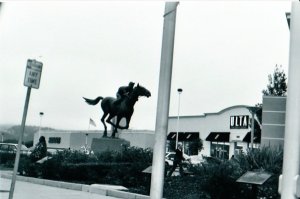 In this day and age, horse racing as a sport suffers from both a lack of mainstream coverage, and damaging negative press. The average person probably knows about the Kentucky Derby, peaks an interest if the Triple Crown is on the line, or reads about the unfortunate breakdowns and race day medication issues in American racing.
In this day and age, horse racing as a sport suffers from both a lack of mainstream coverage, and damaging negative press. The average person probably knows about the Kentucky Derby, peaks an interest if the Triple Crown is on the line, or reads about the unfortunate breakdowns and race day medication issues in American racing.
Compare that to the 1930s and 40s, when boxing, baseball and horse racing reigned supreme. The mainstream public knew the ins and outs of the game much more than today, and the track was a popular place to set a movie.
The sad thing is, while there are some bad apples in the cart, most associated with racing love the sport and its athletes. It’s a 365 days a year job, with long hours starting at the crack of dawn, no vacations, and sometimes, little reward. Racing is something that has to be in your blood, and chances are if it is, it’s a hard thing to shake.
Director Frank Capra captured some of that passion in his 1934 film, Broadway Bill. Released in November of 1934, Broadway Bill has the unfortunate distinction of being stuck between It Happened One Night and Mr. Deeds Goes to Town in the Capra canon. Thus, it is much less known. In fact, in going back and flipping through Capra’s autobiography, The Name Above the Title, there’s really no mention of the production of the movie.
Broadway Bill features Warner Baxter as Dan Brooks, a man with previous ties to the racing world who gave it up to marry Margaret Higgins (Helen Vinson). Margaret is the oldest of the four daughters of J.L Higgins (Walter Connelly), a strict businessman and the founder of Higginsville. Each of the son-in-laws is charged with a Higgins business, with Brooks stuck at the paper box company.
To keep himself happy, Dan sneaks out to train his one racehorse, a maiden named Broadway Bill. Bill is a leggy colt with a distinctive broken blaze down his forehead and a lot of promise. Dan is helped by his groom, Whitey (Clarence Muse), and the youngest Higgins daughter, Alice (Myrna Loy), whom he calls “Princess.” Margaret disapproves of her husband’s actions, feeling that her stable, wealthy lifestyle is threatened by Dan’s racetrack dreams.
At the next meeting of the business heads, J.L. calls Dan out for his lack of supervision at the paper box company, and demands he get rid of the horse. Dan finally decides to leave his job and hits the road with Whitey and Broadway Bill in tow, searching for a good spot for Bill’s first race.
Completely broke, Dan can’t afford to board Broadway Bill in the track stables, and is forced to keep him in the ramshackle barn of the feed supplier. Knowing he has a good horse, he keeps Bill under wraps and sets his sights on the big Imperial Derby.
With no money to front the Derby entry fee of 500 dollars, Dan decides to run Bill in a race to hopefully win the money they need. But the horse, still young and inexperienced, throws his rider at the barrier and takes off, landing on the schooling list until he can prove that he can start a race. Dan writes letters home to Margaret, asking her to come and visit, and bring Bill’s sidekick rooster to calm the horse. Margaret refuses, but Alice, seeking adventure, brings Dan the rooster and joins him at the track.
The trio then braves several obstacles on their way to the final race. Bill falls ill after a rainstorm leaks water into the barn all night, Dan is thrown in jail for not paying his feed bill, and his attempts to borrow the money he needs from friends proves futile when they also turn out to be broke. Through Alice selling her expensive clothes and jewelry, they are able to scrap up the Derby entry fee, and Dan is bailed out by a seemingly kind man who also offers him a jockey to ride Bill. Little does Dan know that this man is a bookmaker looking to fix the race for better odds on the horse he’s supporting.
Dan saddles Broadway Bill for the race, thinking his luck has turned. During the running of the contest, Bill is restrained by his jockey in an attempt to keep him from winning. But coming around the turn the colt grabs the bit and takes off, winning the race in driving fashion. Just a few strides after the wire, Bill collapses and dies of a heart attack.
As Broadway Bill is buried on the racetrack infield the following day, Dan realizes that although he is shattered, his place is at the track. Alice decides she will return home, but is happy for Dan, knowing he is free.
Years pass, and at a similar business meeting at the Higgins residence, J.L. announces that he has sold off most of his businesses and expects his son-in-laws to go to work and make something of themselves. At that moment, a car horn is sounded and rocks thrown through the dining room windows, with the declaration to “release the princess from the dark tower.” Alice rushes out to find Dan and Whitey, and two new horses, Broadway Bill II and Princess. Just as Alice says goodbye, J.L. makes the spontaneous decision to leave, and asks to join them.
Broadway Bill is a fairly simple film. There are the Capra touches of his themes of the working man and his unrelenting vision, but not nearly at the level that they would be explored in the Common Man trilogy of Mr. Deeds, Meet John Doe and Mr. Smith Goes to Washington. While Baxter and Loy are solid in the leads, Capra does a good job with his supporting players, making them interesting characters with large personalities. Unfortunately for Clarence Muse, a lot of Whitey’s character is based on racial stereotypes, but through most of the film I think there is a sense of friendship and admiration between Dan and Whitey.
One of my favorite sequences in this film is the final race. Shot at Tanforan Race Track, Capra gets up close with the horses, and unlike today where actors aren’t put at risk riding at high speeds, the racing footage is real. It helps give a sense of the racehorse as an athlete, their drive and competitiveness.
Interestingly enough, Warner Baxter apparently was scared of horses, so taking this role proved to be a challenge for him. Capra would remake Broadway Bill in 1950 as Riding High, where Bing Crosby was cast as Dan Brooks. Crosby had no issues with horses, owning racing thoroughbreds of his own.

A snapshot I took on a trip to San Francisco a few years back of the statue of Seabiscuit that now stands at the shopping mall built over the old Tanforan site.
As for the shooting locations, Tanforan no longer exists. Built in San Bruno, California near San Francisco, Capra shot racing scenes for both Broadway Bill and Riding High there. During its heyday, the track saw such horses and Seabiscuit and Citation on the grounds. It burned down in a 1964 fire, and the site is now home to a shopping mall.
While Broadway Bill in my opinion doesn’t have the force of impact as some of Capra’s later films, it’s a mostly breezy comedy-drama with a likable cast. I can relate to Dan Brooks in the way that I have always been enchanted by racehorses. Their sleek, on-their-toes and fiery presence was in direct contrast to the gentle, plodding creatures I rode when I was younger. A good racehorse, like a Secretariat, captures the masses’ imagination of greatness. In many ways, Broadway Bill captures just a little bit of that magic, using a horse to bring together characters, and inspire them to chase their dreams.
This post is my contribution to Page’s Horseathon. Check out My Love of Old Hollywood for links to the other Horseathon entries.







Such a sweet film. One thing about the many horse movies – they bring the humans together. Aren’t they clever animals? And who wouldn’t pick Myrna Loy over Helen Vinson?
I know, right? Myrna Loy is so fun in this movie. Thanks for stopping by!
Lovely! Horse derbies were pretty common in the 1930’s, that’s why we find many movies from this era with the hore theme. I, for example, have used A Day at the Races, a 1937 movie, for the blogathon.
I love Frank Capra. And he can’t get better than working with Myrna Loy. She’s so adorable. I’ll look for this movie.
Greetings,
Le
Hi Le,
Thanks for reading and the comment! Yes, I believe the fact that horseracing was a much more mainstream sport back then made the track a more common place to set a movie. Capra is one of my all-time favorites as well, so the fact that he did a movie having to do with horseracing made it a must-see for me!
Great post! You have some good insights on horse racing and I found the background on the making of the film very interesting. I’m a big Capra fan, yet have never seen BROADWAY BILL. Learning that Myrna Loy is in it too makes me want to see it even more!
Thanks! I’m a huge racing fan, have been since I was little. There’s so much history to the game, and I enjoy pouring over pedigrees and past performances in my spare time.
Broadway Bill is worth checking out if you’re a Capra fan. It’s fun to see where it fits into his overall filmography, especially knowing that what was coming in the next few years of his career after Broadway Bill.
Thanks for reading and the comment!
Lindsay,
I think we’re all fans of Capra films regardless of the script but this film was entertaining to me. I’m a big fan of Warner Baxter and I love seeing him not playing a bandit, a bad guy or a cowboy.
I’m glad you mentioned horse racing an how it’s popularity has stood the test of time. We have a really nice racetrack here in OKC that was built several years ago. I used to go out there frequently but now I only go once a year if that. Really a shame since I have a great time watching the horses before each race. I haven’t ridden a horse in years but we were around them a lot as kids.
This was already such a great review but adding the extra trivia made it even more fun. I had no idea that Warner was afraid of horses. I would have never guessed that considering all of the films his done where he rides so comfortably. (More Hollywood magic)
Thanks so much for doing my Horseathon! This was a nice contribution.
Page
Hi Page,
Thanks so much for hosting! I can’t tell you how psyched I was to find out you were doing an event centered around horse movies.
The only other thing I’ve seen Warner Baxter in was 42nd Street, and I love him in that and Broadway Bill, so I’ll be looking out for him more. And yes, he doesn’t look obviously uncomfortable in this movie around the horse, so Capra did something to make it work!
Thanks again for the opportunity to write for a great event, and the kind words!
I agree with Page – I like that you pointed out how much more popular racing was in the 1930s than it is today. Good post… as always!
Thanks for stopping by and the kind words! I truly wish racing was as popular today as it was back then, even up until the 1970s. I think a lot of people would say that Ruffian’s breakdown in 1975 in her “battle of the sexes” match race against Foolish Pleasure was a huge blow to the sport that it never really recovered from. But the Triple Crown is on the line this year, so who knows!
Good piece, Lindsay! Must agree you wouldn’t know that Baxter was frightened of horses from seeing the film – I wonder whether he had a bad experience in one of his previous films that made him afraid? Capra is totally unsympathetic about his fear in his autobiography, just commenting scathingly that Baxter ruined his film and that he couldn’t do a lot of the scenes with the horse he wanted to do – but I liked the film a lot anyway and thought Baxter and Myrna Loy worked together well in it. They made a few films together – I’ve recently seen ‘Penthouse’ which is great too, with a lot of witty dialogue. Haven’t seen ‘Riding High’, but I do like Bing Crosby and I’d be interested to see how it compares with ‘Broadway Bill’. Page, I’m enjoying reading the horseathon contributions!
Thanks so much! I wonder about Baxter’s previous horse experience as well, maybe they just freaked him out, although the horse that played Bill looked like one of the most placid horses I’ve ever seen. I hear Riding High is almost a direct remake, dialogue and all, but have yet to see it as well. I believe someone else was doing a post on it for the horseathon.
Capra really knows how to tell a story and the interesting background and wonderful collection of character actors make “Broadway Bill” a most enjoyable movie. Your great article may have turned more people onto this overlooked flick.
Thanks for reading, and the kind words! It’s definitely a nice, entertaining film.
Wonderful post about horse racing.. I will have to check out this film..
Thanks for stopping by!
Hi Lindsay, may I begin by saying how nice it is to see you are part of the horseathon. Your post reminds me that while I am a dedicated film fan; I am something of a fair weather racing fan. I have seen and enjoyed “Broadway Bill”, but I couldn’t describe my interest in racing in the same sentiment of your words, “Racing is something that has to be in your blood, and chances are if it is, it’s a hard thing to shake.” I have followed the triple-crown races for almost a decade, but my off season interest in less passionate. I am, however, still rooting for “I’ll Have Another” to win this year’s Triple Crown title. The background information on Tanforan Race Track and your personal photo, ultimately bring a film version of horse racing to life (a bit disheartening to see Seabiscuit’s statue decorating a mall parking lot).
Thank you for the kind words. I’m rooting hard for I’ll Have Another, especially as he would be the first Triple Crown winner I have witnessed in my lifetime if he can pull it off.
It was pretty bizarre to think that was where a track had once stood. Tanforan, like Santa Anita racetrack in Southern California, was also a Japanese detention center during WWII, so there are markers around the grounds telling that history as well. Now it’s just this huge mall.
Great review, Lindsay! I’m actually a big fan of Broadway Bill — I think the racetrack background negates a lot of the usual Capra stickiness. (Plus Myrna Loy…hubba…and might I also add…hubba.)
Hi Ivan! Thanks for the comment. Loy is great fun here, I love her character’s free spirit. I think that’s a great point about the setting helping to offset some of the Capracorn that, while I love it, can drive some people crazy. The ending with Bill dying is also against how I think most people would imagine the movie ending knowing it’s a Capra film. While very sad, I think it’s a more powerful catalyst for change in the characters than the traditional sports film ending where the protagonist wins and goes out on top.
Pingback: 2012 In Film | Lindsay's Movie Musings